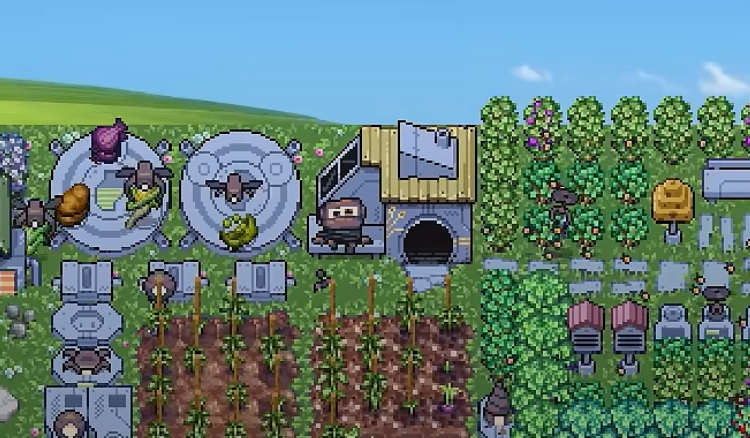Rustys pensjonerte utvikler sitter fortsatt på samme PC etter en halv million salg
Jordan Morris, the solo developer behind Rusty’s Retirement, sold over 550,000 copies of his indie farming sim, but he’s still working on the same five-year-old €1,000 PC. Despite the game’s surprise success on Steam, Morris hasn’t made any big lifestyle changes — no luxury upgrades, no flashy purchases. Just more time and space to make games, which is exactly what he wants to do.
Morris is the founder of Mister Morris Games and previously made the Metroidvania Haiku, the Robot. His latest title, Rusty’s Retirement, is a relaxed idle farming sim that takes clear inspiration from Stardew Valley. It resonated quickly with players who wanted something chill to run alongside their daily work or gaming sessions. The game’s success gave him financial breathing room, but not much else changed in his life, on purpose.
“We’ve literally done nothing else differently for the last year that Rusty’s been out,” Morris said. “We just keep doing the same things that we used to do. The only thing that we’ve spent money on is getting this apartment, and that’s only because we felt like we’re starting a family, we need something bigger, and if we have the means then we should. And that’s it. But I still drive the same car. I actually still have the same computer. I mean, it wasn’t cheap, but it’s like a €1,000 computer from five or six years ago. It’s still doing good.”
That’s a near-identical story to what Stardew Valley creator Eric Barone shared after the explosive success of his game — his only big splurge was upgrading from a hand-me-down rig to a proper gaming PC. Morris, it seems, shares that same mentality: get just enough to keep working comfortably, and focus on the next game.

While the sales numbers gave Morris the ability to fund trips to Tokyo Game Show and Gamescom, his core goal hasn’t changed. He says all he really wants is enough income to keep making more games. That means keeping overhead low and staying productive, not chasing lifestyle inflation.
Making games is the goal, not the side effect. Morris thinks about game development as both an art and a business, and he’s clear about how he balances those two sides. After releasing Haiku, the Robot, he didn’t immediately know what to build next. Instead of stressing over the perfect idea, he made a list of concepts and gave himself two weeks to prototype each one.
“I would say I have a list of ideas,” he explained. “All of these ideas seem good to me, things that I would like to make, and things that I would probably like to play as well. And this is what I did for Rusty, actually. Before Rusty, after Haiku, I had no idea what I wanted to make, so I had this list of ideas, and I would spend two weeks prototyping each idea. I just set a deadline of, I’m going to give myself two weeks to just make this into something so I can at least get a better idea of, is this idea good or not?”
After each prototype, he would post his work to social media and see what kind of traction it got. That feedback gave him a sense of what had potential not just as a fun project but as a product people might want. It’s a method, he says strikes a balance between making something personal and making something viable for the market.
This lean, fast, test-heavy approach worked for Rusty’s Retirement, and Morris plans to use the same strategy for future projects. It’s a way to keep development focused without guessing too long, and it also keeps things simple. Try it, share it, and build what sticks.
Stylistically, Mister Morris Games titles don’t follow a strict formula, but they have a consistent charm. Robots tend to show up, and there’s a polished feel to even the simplest interactions. Morris admits he hasn’t really nailed down a full definition of his personal style, but it boils down to small things that feel right in the player’s hands.
“That’s a good question. I haven’t thought of that before. What defines a game made by me?” he said. “I’d say cutesy, maybe. Robots obviously seem to be a theme here. And just a good time. As long as everything’s fun.”
He goes on to explain that he pays close attention to detail, especially around feel. With Haiku, the Robot, he spent months tweaking the controls to get them just right — a tight platformer needs to respond well, or it falls apart. And even with an idle sim like Rusty’s Retirement, the feel of progression and the balance of gameplay modes are carefully tuned to support both casual and more hardcore playstyles.
“Making sure that there’s different ways to have fun, and making sure that it feels good,” he added. “Everything needs to feel good. I would say that’s one of my top priorities when I make a game. Does this action feel good? Is it understandable? Is it simple? Is it clear?”
So far, that approach is working. While Morris hasn’t revealed what his next title will be, it’s likely already in early development, going through the same prototyping loop that gave birth to Rusty’s Retirement. And he’ll probably still be building it on that same reliable €1,000 PC, in the same routine, without any urge to change what’s already working.
For Morris, success isn’t about cashing out — it’s about buying time to keep creating.
Source: GamesRadar+

Kommentarer